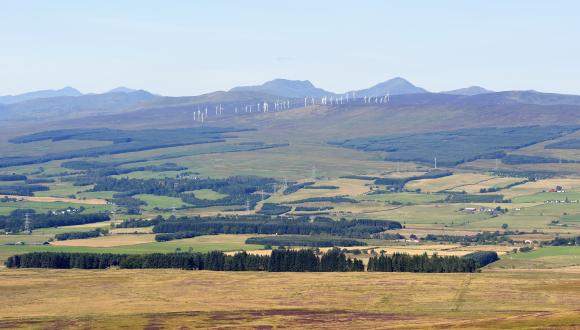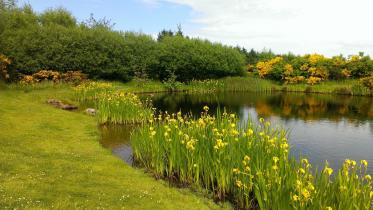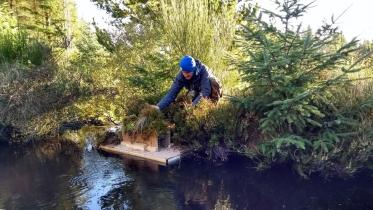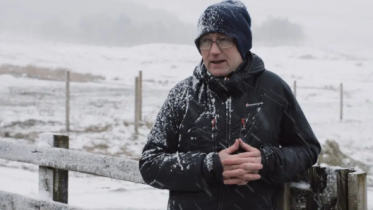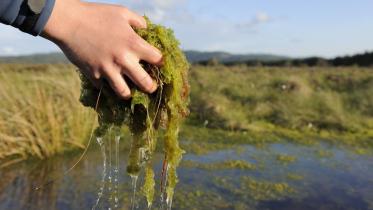Piloting an Outcomes Based Approach in Scotland (POBAS) project, Phase 2 report
Published: August 2022
Summary of Phase 2
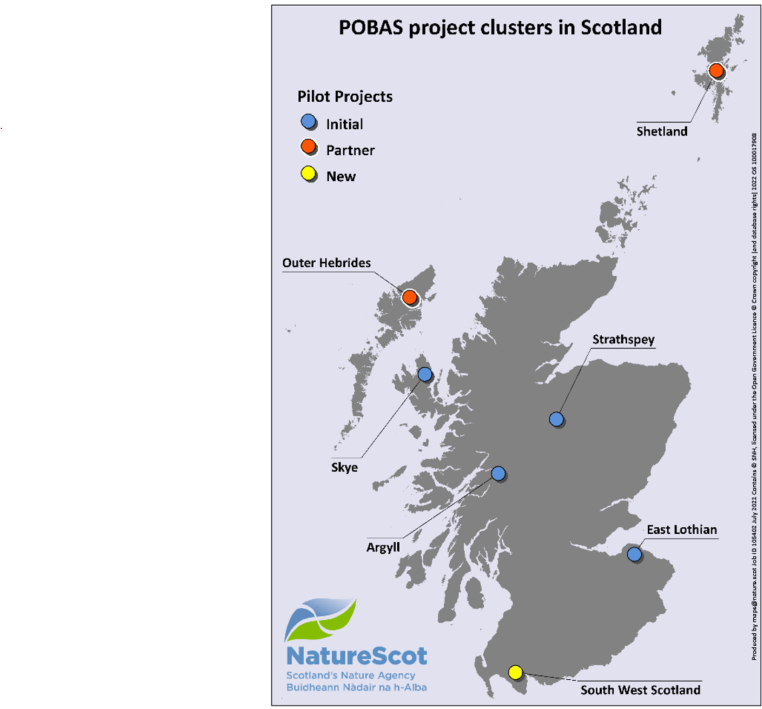
Map of Scotland showing POBAS project clusters in Shetland, Outer Hebrides, Skye, Strathspey, Argyll, East Lothian, South West Scotland
Piloting an Outcome Based Approach in Scotland (POBAS) is a NatureScot-led project to test a payment-by-results-based approach to delivering environmental outcomes on farms and crofts in Scotland. Around 80 farmers and crofters contributed to the project in seven clusters across Scotland covering a range of farm types on Skye, Argyll, Strathspey, East Lothian, South West Scotland, Shetland and Outer Hebrides. The latter two pilots were implemented through partner projects, working with RSPB and European Forum for Nature Conservation and Pastoralism (EFNCP) respectively. South West Scotland was a new project cluster for Phase 2 working on a whole farm approach with Dairy farmers.
The project started in 2019, with Phase 2 (April 2020 – March 2021) running as a continued development of the project. The approach is based on developing habitat scorecards that farmers and crofters can use to assess habitats and wildlife on their farms. It is strongly based around farmer and crofter engagement with participating farmers and crofters identifying what works best. This phase involved site visits to participants’ holdings and continued scorecard development based on the results of feedback and practical testing by farmers, as well as developing guidance to support the assessment. Working with consultants Iceni Earth, an app has been created to enable farmers and crofters to understand, improve and share information on biodiversity.
The POBAS project is part of Scotland’s Natural Capital Pilot Programme, testing natural capital and outcomes-based approaches to inform future rural policy.
Overall, the approach has been welcomed with enthusiasm by participating farmers and crofters and wider stakeholders. A number of issues still need to be addressed through further development in Phase 3 from April 2021 (including further testing and development of the scorecards and app to test in a wider range of scenarios).
POBAS Aims
- Demonstrate how a results- based approach to agri-environment schemes can work in different regions across different farm types;
- Understand implementation issues associated with a results-based approach including practical barriers, issues and opportunities, and farmer behaviour;
- Test the range of outcomes that can be delivered through this approach and how these are translated to management measures and indicators at the field, farm, and landscape levels;
- Identify solutions and recommendations to inform delivering an agri-environment scheme using this approach as part of future farming support architecture beyond 2024.
This project resonates strongly with the recommendations from the farmer-led working groups set up by Scottish Government in late 2020 to advise on making Scottish agriculture more sustainable, in particular how farmed land can contribute to climate change targets and improving biodiversity.
Outcomes investigated in each pilot area
A number of environmental outcomes have been tested in each of the pilot areas. The list of environmental outcomes tested include:
- Habitat management for waders - Strathspey
- Hedges and field margins – East Lothian
- General habitats - grassland and habitat mosaics - on marginal land beyond the in-bye, together with the hill land and peatland/bog - Argyll
- Whole croft diversity based on mixed livestock management of (general habitats) semi natural grassland on in-bye - Skye
- Whole farm biodiversity – Dairy, South West Scotland
- Peatland quality and wader grassland - Shetland
- Common grazings - general habitats, blanket bog, machair and wader grassland – Outer Hebrides.
Project Progress
Expert environmental consultants (see Appendix) were engaged to work with NatureScot and an average of 10 farmers/crofters per pilot. They conducted site visits to each pilot participant’s land holding to test scorecards in the field and held at least one virtual workshop in each of the pilot areas. A dissemination workshop summarising the findings of Phase 2 was held in April 2021 with over 90 participants from RPID, Scottish Government, NatureScot and the NCAPP external steering group. Covid restrictions from March 2020 significantly impacted the rate of progress overall.
Scorecards are a critical element of any results-based approach, as a means of describing and encouraging ideal management to achieve the desired habitat outcomes, and are important as a tool to measure and monitor success. The following scorecards were developed:
- General Habitats scorecard: Applicable to a wide range of species rich habitats including species rich grassland and mosaic habitats;
- Peatland scorecard: This card has been developed to be used within both the Outer Hebrides and Argyll pilots with further development work still required;
- Machair scorecard: It was relatively straightforward to develop the first draft of this card, given that the management of machair is relatively well understood;
- Grassland for Waders: This card was developed for the Strathspey pilot but further development work is still required to consider for example different vegetation structure;
- Hedgerows: The accepted principle is that hedgerows move through a hedge stage cycle and so two aspects of assessment were developed: a hedge stage assessment; and a scorecard which picks out key attributes of a healthy hedge;
- Field Margins: Development of a simple scorecard together with reference to a suite of field margin types. The biggest issue with this was trying to develop a single scorecard to be applicable to a wide range of margins with different objectives whilst trying to retain simplicity;
- Dairy – infield and field boundary scorecards: the other six pilots are looking at assessing quality habitats at the field level. The dairy pilot takes more of a whole farm approach, looking for opportunities and means of how to support dairy farmers to improve biodiversity across the board, in a more intensively managed landscape.
Significantly more testing of the scorecards is required to explore the impacts of the range of habitats and conditions. It was also clear that some of the criteria could be at risk of subjective judgements being made about scoring, thus undermining consistency of scoring between farms. Detailed scoring guidance was developed to try to minimise this risk. Weightings of scores were also adjusted to better incentivise changes in management.
App Development
NatureScot was successful in bidding to be part of the Scottish Government CivTech programme to develop a solution to manage the data collected through the project. This led to a contract with Iceni Earth to produce an app for participating farmers and crofters to record POBAS scorecard assessments on the ground and to provide advice on appropriate management. It also produced a digital platform that NatureScot staff can use to view and analyse the data collected through the app.
The prototype was developed into a working product ready for testing with farmers in Spring 2021.
Payments
In theory, it would be possible to pay farmers and crofters for higher levels of outcomes that they achieve, based on the score from the scorecard assessment. However, there is still uncertainty about where payments for outcome-based approaches could sit within future rural support. Some work was carried out across the pilots to consider the financial implications of best practice management, most notably by Gwyn Jones of EFNCP for the western pilots. Payments for specific one-off management actions (e.g hedge planting or creation of wader scrapes) and payments to support ongoing annual management were considered, noting in particular the need to support cattle grazing in the west.
NatureScot Contact: [email protected]
Appendix
The list of expert environmental consultants used in each pilot area is shown below:
Strathspey: Paul Chapman, SAC Consulting
Argyll and Lochaber: Helen Bibby, SAC Consulting and Gwyn Jones, European Forum for Nature Conservation and Pastoralism (EFNCP).
Skye: Janette Sutherland, SAC Consulting and Gwyn Jones, EFNCP
East Lothian: Tony Seymour, The Farm Environment Limited
Dairy: Hamish Walls and Fergus Younger, SAOS and Maggie Magee and Sandra Stewart, ScotFWAG
Outer Hebrides: Robyn Stewart and Gwyn Jones, EFNCP
Shetland: Nathalie Pion, RSPB
